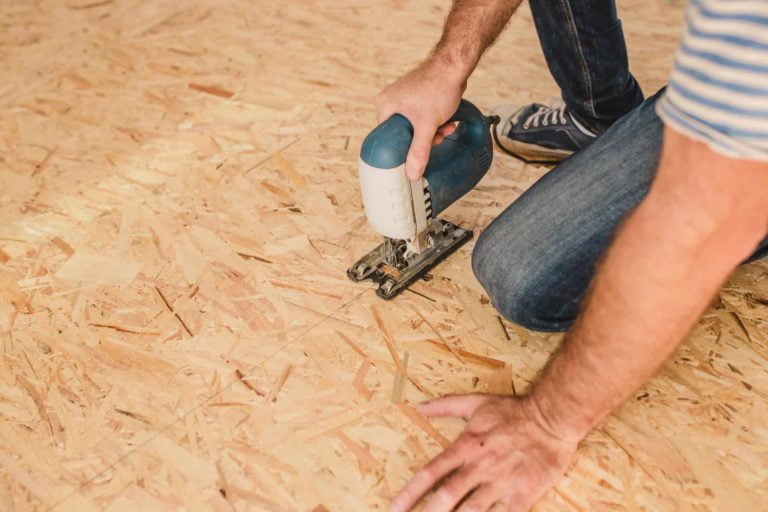Most people do not think about their subfloor when considering new hardwood flooring. But this foundation for your hardwoods is one of the most important parts of your installation. It is the part that lies under hardwood flooring and out of view. But it provides the strength and longevity of your investment. Below, we look at the types of subfloor required for hardwood floors and factors you should consider before your flooring project begins.
Contents:
Four Layers of Hardwood Flooring
Your smooth, beautifully sanded, and stained hardwoods are not just simple planks pieced together. Instead, they are the top layer of four. Each layer performs its own function.
These layers include:
- Joists, the parallel structures running between beams or walls to hold up the floor
- Subfloor, the structural layer on top of joists that provides a stable, solid surface for people, furniture, and household elements
- Underlayment is the layer over the subfloor that provides a smooth and flat surface on which flooring is installed
- Hardwood flooring, whether solid hardwoods or engineered hardwoods, is the layer visible within your living spaces
Installation of Your Hardwoods
The types of subfloor used in your home determine appropriate methods for installing your hardwoods. The most common methods for installation include stapling or nailing the flooring to the subfloor. While this works well for solid hardwoods and engineered hardwoods alike, you have more options with engineered flooring. For these, you can also choose to glue down your flooring or use a floating installation.

Ideal Types of Subfloor for Hardwoods
The ideal types of subfloor for hardwoods are generally plywood. Although plywood is the best material, it is available in varied thicknesses. You should talk to your hardwood flooring pros at Tri Point Flooring about your subfloor to ensure the existing material suits your installation. This typical thickness is 1/2-inch to 3/4-inch thick plywood.
Besides varied thicknesses for plywood, these types of subfloor are also available in multiple forms. Your hardwoods are less likely to squeak if you use tongue-and-groove plywood. Tongue-and-groove sheets fit together more securely.
The Moisture Factor in Types of Subfloor
When installing hardwoods, it is important to consider moisture as a factor. Your subfloor must stay just as dry as your hardwood surface to prevent damage to this critical layer of your installation. Pay particular attention to the moisture factor if placing hardwoods in a kitchen, mudroom, bathroom, or laundry room.
Moisture damages all layers it comes into contact with, making it very important to keep your floors dry and use proper materials. You must protect your subfloor from water seepage from surface spills or leaks. Seal any cracks and ensure it is not uneven in any areas. Water can pool in uneven spots of subflooring, leading to rotting.
By installing the right types of subfloor for your hardwoods and ensuring they stay moisture-free, you can enjoy your hardwoods much longer.
Pay Attention to Flooring Grade
Even the best types of subfloor cannot provide a good surface for solid hardwoods below grade. Installing hardwoods below the outside ground level makes it almost impossible for moisture to evaporate from beneath the flooring. Since basements are typically below grade, you should install engineered hardwoods in these areas of your home. You can find engineered hardwoods that look similar to the solid hardwoods used in above-grade levels.
Pay attention to types of subflooring used above grade. For these levels of your home, the strength of your subfloor and joists is critical to the durability of your installed flooring. Ensure the subfloor is strong and rigid enough to support solid hardwoods. Use OSB or plywood, not particle board or chipboard.
The best scenario for solid hardwood flooring installation above grade is OSB or plywood of 3/4″ or more. But particle board and chipboard can work for engineered hardwoods.
What to Put Under Hardwood Flooring for Optimal Results
When deciding what to put under hardwood flooring, choosing the right underlayment is crucial. The underlayment provides a smooth surface, enhances soundproofing, and improves insulation. Options include foam, cork, and rubber, each offering unique benefits. Foam is affordable and provides basic cushioning. Cork is eco-friendly and great for noise reduction.
Rubber, though pricier, offers excellent durability and moisture resistance. It’s essential to match the underlayment to your specific needs and the type of subfloor you have. Understanding what to put under hardwood flooring ensures a stable, comfortable, and long-lasting installation for your home.
Best Underlayment For Hardwood Flooring
The best underlayment for hardwood flooring depends on the types of subfloor installation and the specific needs for moisture control, sound reduction, and thermal insulation. A good underlayment can provide a moisture barrier, reduce noise, and improve the overall longevity of the flooring.
For example, options, like felt or cork, can offer excellent sound absorption and a degree of thermal insulation, making them ideal for hardwood floors installed over cold subfloors or in multi-level buildings. Synthetic underlayments with built-in vapor barriers are particularly effective in damp areas or over concrete slabs to prevent moisture damage.
Discover the beauty and durability of premium hardwood flooring from Tri Point Flooring. Elevate your space with our expert installation and high-quality materials.
Turn to the Tri Point Flooring Pros for the Best Hardwood Flooring Installation
When you want to ensure your hardwood flooring is installed for beauty, durability and longevity, you only need to enlist the help of the pros at TriPoint Flooring. We will ensure you have the right type of subfloor as a foundation for your new hardwoods. Call us today for a consultation in Raleigh, Apex or Cary, NC at (919) 771-7542.




